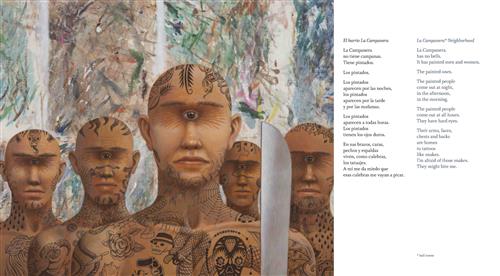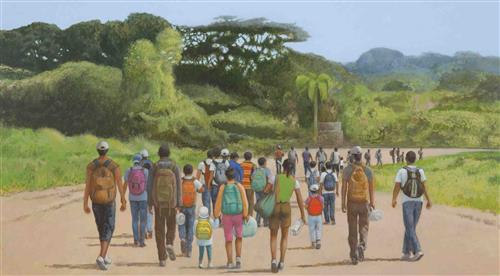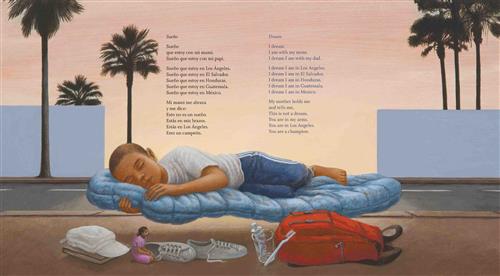An eloquent and timely plea for understanding refugees.
Why are young people leaving their country to walk to the United States to seek a new, safe home? Over 100,000 such children have left Central America. This book of poetry helps us to understand why and what it is like to be them.
This powerful book by award-winning Salvadoran poet Jorge Argueta describes the terrible process that leads young people to undertake the extreme hardships and risks involved in the journey to what they hope will be a new life of safety and opportunity. A refugee from El Salvador’s war in the eighties, Argueta was born to explain the tragic choice confronting young Central Americans today who are saying goodbye to everything they know because they fear for their lives. This book brings home their situation and will help young people who are living in safety to understand those who are not.
Compelling, timely and eloquent, this book is beautifully illustrated by master artist Alfonso Ruano who also illustrated The Composition, considered one of the 100 Greatest Books for Kids by Scholastic’s Parent and Child Magazine.
Correlates to the Common Core State Standards in English Language Arts:
CCSS.ELA-LITERACY.RL.2.1
Ask and answer such questions as who, what, where, when, why, and how to demonstrate understanding of key details in a text.
CCSS.ELA-LITERACY.RL.2.4
Describe how words and phrases (e.g., regular beats, alliteration, rhymes, repeated lines) supply rhythm and meaning in a story, poem, or song.
CCSS.ELA-LITERACY.RL.2.7
Use information gained from the illustrations and words in a print or digital text to demonstrate understanding of its characters, setting, or plot.
CCSS.ELA-LITERACY.RL.3.4
Determine the meaning of words and phrases as they are used in a text, distinguishing literal from nonliteral language.
CCSS.ELA-LITERACY.RL.3.5
Refer to parts of stories, dramas, and poems when writing or speaking about a text, using terms such as chapter, scene, and stanza; describe how each successive part builds on earlier sections.
CCSS.ELA-LITERACY.RL.3.7
Explain how specific aspects of a text's illustrations contribute to what is conveyed by the words in a story (e.g., create mood, emphasize aspects of a character or setting)
CCSS.ELA-LITERACY.RL.4.1
Refer to details and examples in a text when explaining what the text says explicitly and when drawing inferences from the text.
CCSS.ELA-LITERACY.RL.4.2
Determine a theme of a story, drama, or poem from details in the text; summarize the text.
CCSS.ELA-LITERACY.RL.4.5
Explain major differences between poems, drama, and prose, and refer to the structural elements of poems (e.g., verse, rhythm, meter) and drama (e.g., casts of characters, settings, descriptions, dialogue, stage directions) when writing or speaking about a text.
CCSS.ELA-LITERACY.RL.4.7
Make connections between the text of a story or drama and a visual or oral presentation of the text, identifying where each version reflects specific descriptions and directions in the text.
CCSS.ELA-LITERACY.RL.5.2
Determine a theme of a story, drama, or poem from details in the text, including how characters in a story or drama respond to challenges or how the speaker in a poem reflects upon a topic; summarize the text.
CCSS.ELA-LITERACY.RL.5.4
Determine the meaning of words and phrases as they are used in a text, including figurative language such as metaphors and similes.
CCSS.ELA-LITERACY.RL.5.7
Analyze how visual and multimedia elements contribute to the meaning, tone, or beauty of a text (e.g., graphic novel, multimedia presentation of fiction, folktale, myth, poem).
CCSS.ELA-LITERACY.RL.6.1
Cite textual evidence to support analysis of what the text says explicitly as well as inferences drawn from the text.
CCSS.ELA-LITERACY.RL.6.2
Determine a theme or central idea of a text and how it is conveyed through particular details; provide a summary of the text distinct from personal opinions or judgments.
CCSS.ELA-LITERACY.RL.6.4
Determine the meaning of words and phrases as they are used in a text, including figurative and connotative meanings; analyze the impact of a specific word choice on meaning and tone
CCSS.ELA-LITERACY.RL.6.5
Analyze how a particular sentence, chapter, scene, or stanza fits into the overall structure of a text and contributes to the development of the theme, setting, or plot.
CCSS.ELA-LITERACY.RL.6.7
Compare and contrast the experience of reading a story, drama, or poem to listening to or viewing an audio, video, or live version of the text, including contrasting what they "see" and "hear" when reading the text to what they perceive when they listen or watch.
CCSS.ELA-LITERACY.RL.6.9
Compare and contrast texts in different forms or genres (e.g., stories and poems; historical novels and fantasy stories) in terms of their approaches to similar themes and topics.
An eloquent and timely plea for understanding refugees.
Why are young people leaving their country to walk to the United States to seek a new, safe home? Over 100,000 such children have left Central America. This book of poetry helps us to understand why and what it is like to be them.
This powerful book by award-winning Salvadoran poet Jorge Argueta describes the terrible process that leads young people to undertake the extreme hardships and risks involved in the journey to what they hope will be a new life of safety and opportunity. A refugee from El Salvador’s war in the eighties, Argueta was born to explain the tragic choice confronting young Central Americans today who are saying goodbye to everything they know because they fear for their lives. This book brings home their situation and will help young people who are living in safety to understand those who are not.
Compelling, timely and eloquent, this book is beautifully illustrated by master artist Alfonso Ruano who also illustrated The Composition, considered one of the 100 Greatest Books for Kids by Scholastic’s Parent and Child Magazine.
Correlates to the Common Core State Standards in English Language Arts:
CCSS.ELA-LITERACY.RL.2.1
Ask and answer such questions as who, what, where, when, why, and how to demonstrate understanding of key details in a text.
CCSS.ELA-LITERACY.RL.2.4
Describe how words and phrases (e.g., regular beats, alliteration, rhymes, repeated lines) supply rhythm and meaning in a story, poem, or song.
CCSS.ELA-LITERACY.RL.2.7
Use information gained from the illustrations and words in a print or digital text to demonstrate understanding of its characters, setting, or plot.
CCSS.ELA-LITERACY.RL.3.4
Determine the meaning of words and phrases as they are used in a text, distinguishing literal from nonliteral language.
CCSS.ELA-LITERACY.RL.3.5
Refer to parts of stories, dramas, and poems when writing or speaking about a text, using terms such as chapter, scene, and stanza; describe how each successive part builds on earlier sections.
CCSS.ELA-LITERACY.RL.3.7
Explain how specific aspects of a text's illustrations contribute to what is conveyed by the words in a story (e.g., create mood, emphasize aspects of a character or setting)
CCSS.ELA-LITERACY.RL.4.1
Refer to details and examples in a text when explaining what the text says explicitly and when drawing inferences from the text.
CCSS.ELA-LITERACY.RL.4.2
Determine a theme of a story, drama, or poem from details in the text; summarize the text.
CCSS.ELA-LITERACY.RL.4.5
Explain major differences between poems, drama, and prose, and refer to the structural elements of poems (e.g., verse, rhythm, meter) and drama (e.g., casts of characters, settings, descriptions, dialogue, stage directions) when writing or speaking about a text.
CCSS.ELA-LITERACY.RL.4.7
Make connections between the text of a story or drama and a visual or oral presentation of the text, identifying where each version reflects specific descriptions and directions in the text.
CCSS.ELA-LITERACY.RL.5.2
Determine a theme of a story, drama, or poem from details in the text, including how characters in a story or drama respond to challenges or how the speaker in a poem reflects upon a topic; summarize the text.
CCSS.ELA-LITERACY.RL.5.4
Determine the meaning of words and phrases as they are used in a text, including figurative language such as metaphors and similes.
CCSS.ELA-LITERACY.RL.5.7
Analyze how visual and multimedia elements contribute to the meaning, tone, or beauty of a text (e.g., graphic novel, multimedia presentation of fiction, folktale, myth, poem).
CCSS.ELA-LITERACY.RL.6.1
Cite textual evidence to support analysis of what the text says explicitly as well as inferences drawn from the text.
CCSS.ELA-LITERACY.RL.6.2
Determine a theme or central idea of a text and how it is conveyed through particular details; provide a summary of the text distinct from personal opinions or judgments.
CCSS.ELA-LITERACY.RL.6.4
Determine the meaning of words and phrases as they are used in a text, including figurative and connotative meanings; analyze the impact of a specific word choice on meaning and tone
CCSS.ELA-LITERACY.RL.6.5
Analyze how a particular sentence, chapter, scene, or stanza fits into the overall structure of a text and contributes to the development of the theme, setting, or plot.
CCSS.ELA-LITERACY.RL.6.7
Compare and contrast the experience of reading a story, drama, or poem to listening to or viewing an audio, video, or live version of the text, including contrasting what they "see" and "hear" when reading the text to what they perceive when they listen or watch.
CCSS.ELA-LITERACY.RL.6.9
Compare and contrast texts in different forms or genres (e.g., stories and poems; historical novels and fantasy stories) in terms of their approaches to similar themes and topics.
| Published By | Groundwood Books Ltd — Oct 1, 2016 |
| Specifications | 36 pages | 9.25 in x 8.5 in |
| Keywords | grade 4; grade 5; poetry; translations; author's note; United States; Central America; |
| Written By |
JORGE ARGUETA, a Nahua from El Salvador and Poet Laureate Emeritus of San Mateo County, is a prize-winning author of more than twenty children’s books. His book Somos como las nubes / We Are Like the Clouds won the Lee Bennett Hopkins Poetry Award and was named to USBBY’s Outstanding International Books List, ALA Notable Children’s Books and the Cooperative Children’s Book Center Choices. Jorge is the founder of the International Children's Poetry Festival Manyula and the Library of Dreams, a non-profit organization that promotes literacy in El Salvador. Jorge divides his time between San Francisco, California, and El Salvador. |
| Illustrated by | Alfonso Ruano is an illustrator and the art director for Grupo SM, the world's largest publisher of Spanish-language children's books. He lives in Madrid, Spain. |
| Written By |
|
JORGE ARGUETA, a Nahua from El Salvador and Poet Laureate Emeritus of San Mateo County, is a prize-winning author of more than twenty children’s books. His book Somos como las nubes / We Are Like the Clouds won the Lee Bennett Hopkins Poetry Award and was named to USBBY’s Outstanding International Books List, ALA Notable Children’s Books and the Cooperative Children’s Book Center Choices. Jorge is the founder of the International Children's Poetry Festival Manyula and the Library of Dreams, a non-profit organization that promotes literacy in El Salvador. Jorge divides his time between San Francisco, California, and El Salvador. |
| Illustrated by |
| Alfonso Ruano is an illustrator and the art director for Grupo SM, the world's largest publisher of Spanish-language children's books. He lives in Madrid, Spain. |
| Audience | ages 7 to 12 / grades 2 to 7 |
| Reading Levels |
Guided Reading S
Lexile NP |
| Key Text Features | translations; author's note |
| Common Core |
CCSS.ELA-LITERACY.RL.6.5
CCSS.ELA-LITERACY.RL.2.7 CCSS.ELA-LITERACY.RL.6.4 CCSS.ELA-LITERACY.RL.3.5 CCSS.ELA-LITERACY.RL.5.2 CCSS.ELA-LITERACY.RL.6.2 CCSS.ELA-LITERACY.RL.3.7 CCSS.ELA-LITERACY.RL.4.7 CCSS.ELA-LITERACY.RL.2.1 CCSS.ELA-LITERACY.RL.6.7 |
Commended, NCTE Notable Poetry List, 2017
Commended, School Library Journal Top 10 Latinx Books, 2016
Commended, USBBY's Outstanding International Books List, 2017
Commended, ALA Notable Children's Books, 2017
Commended, Booklist Top 10 Diverse Nonfiction for Youth, 2017
Commended, Cooperative Children's Book Center, CCBC Choices, 2017
Winner, Lee Bennett Hopkins Poetry Award, 2017
Commended, Américas Award for Children's and Young Adult Literature, 2017
“With tenderness and humanity, this bilingual book describes the hopes, fears, and uncertainties of the thousands of displaced children that arrive every year at the southern border of the United States . . . Poignant, heartbreaking, and sadly, timely.” — Kirkus, STARRED REVIEW
“Argueta and Ruano present a unique and much-needed perspective on the reasons driving young people to immigrate to the U.S. … extremely vital.” — Booklist, STARRED REVIEW
“A much-needed jumping-off point for elementary classroom discussions of refugees and immigration.” — School Library Journal
“Delicately illustrated and painstakingly presented, Somos como las nubes/ We are Like the Clouds is highly recommended, compassionate reading.” — Midwest Book Review
“Ruano's lush paintings feature surreal flourishes … as well as haunting images of families crossing deserts and crowding onto trains. A sobering but hopeful collection.” — Publishers Weekly, STARRED REVIEW
“The poems are vivid and accessible, and Ruano’s earth-toned acrylic illustrations show people on the move who are both fragile and strong at the same time.” — Julie Danielson, Kirkus Reviews
“The poems … present the candid perspective of the children's experiences … Delicate illustrations include both realistic portrayals and surreal depictions that complement the textual imagery.” — Horn Book, STARRED REVIEW




